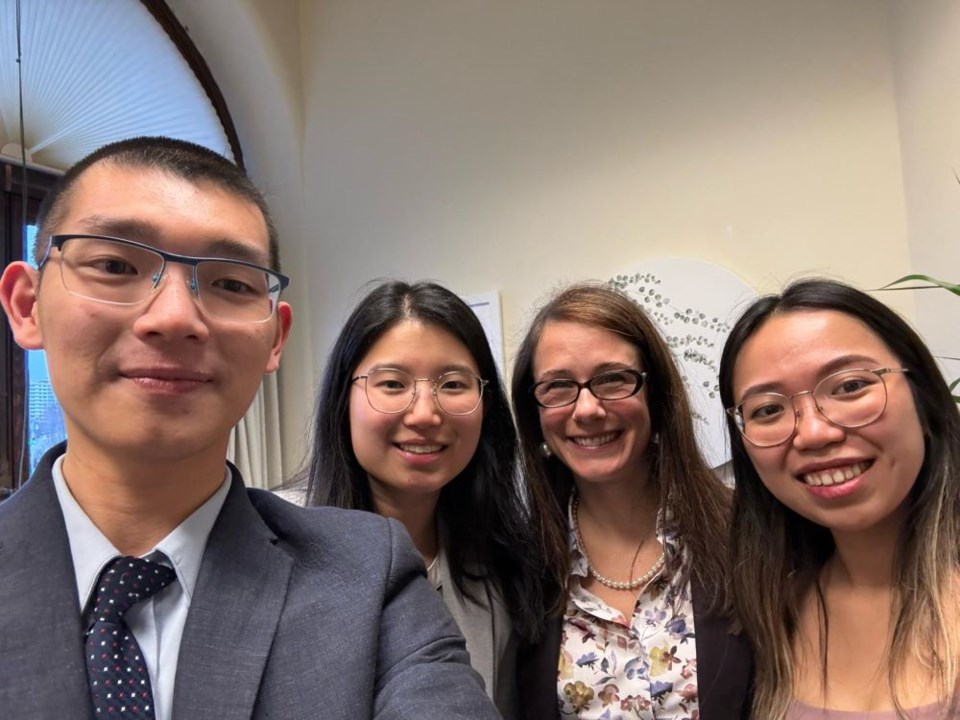A Richmond medical student is sounding the alarm over backlogs in the emergency department, the lack of family doctors and inadequate post-hospital care.
Davy Lau, who’s just received a residency in internal medicine at UBC Hospital, sees these problems as all inter-related.
The lack of primary care – with about 20 per cent of British Columbians without a family doctor – means more people are ending up in the emergency room.
But because wards upstairs in the hospital are full, patients languish in the emergency room waiting for a bed, causing backlogs and long wait times in the ER.
And the lack of community placements – such as long-term care homes and stable housing – is causing many patients to stay longer in wards even though their health is good enough to leave the hospital.
This is leading to ER doctor burnout as doctors feel they can’t give the best care due to factors out of their control, Lau explained.
This was the message Lau and a group of medical students gave to local politicians after a study they conducted into issues plaguing hospital emergency rooms.
The results were presented to the provincial government, including Health Minister Adrian Dix, as well as to MLAs.
Lau went personally to discuss the research study with MLA Kelly Greene.
After conversations with these politicians, Lau said he’s confident they are aware of the problems and are taking some steps to correct them.
But “only time will tell” if these steps will help the crisis in health care.
“Clearly, there’s a lot more work to be done,” he said.
Lau said his personal motivation to be a doctor is to help people on their worst days and save people’s lives.
With his final exams coming up within weeks and his upcoming residency placement, Lau wants to “dedicate” his life to his profession, but he also wants to advocate to policymakers to improve conditions in the profession to help keep the health care system sustainable.
Medical students make health-care recommendations
The study by Lau and other UBC medical students included recommendations such as better safety nets for patients with mental health and addictions issues as well as those needing long-term care leaving the hospital.
“Patients requiring long term care facilities are more likely to present to the (emergency department) if they can’t access appropriate care for their level of fragility in the community,” the report reads.
They also recommended bolstering primary care with a “multi-pronged approach” that includes more Urgent and Primary Care Centres (UPCC), training more doctors and incentivizing family doctors to have evening hours and last-minute appointments for urgent matters.
Other recommendations were for more collaboration between ER doctors and specialists, better transportation for rural patients and better retention strategies for emergency care workforce.
Many of the current health-care problems – lack of family doctors and backlogs in hospitals – stem from a lack of long-term planning, Lau said.
With B.C.’s population growing, he pointed out health-care investments, namely in expanding training for doctors and other health-care staff, hasn’t kept up with growth.
Lau noted that between 2014 and 2023, there was no increase in the number of medical doctors being trained in B.C. even though the population has been steadily growing.
'Housing is health care'
Lau noted there’s a clear link between the health-care issues and the housing crisis in B.C.
Those who are unhoused or have precarious housing are even more vulnerable when trying to access health care, he noted.
In fact, they end up in emergency rooms three times more often than other people, largely because of their lack of primary care.
Lau saw this first hand while doing a rotation at St. Paul’s Hospital.
“They do come back to emergency because their needs are not being met in the community,” he said.
Lau said, when he met with Greene, her feedback hit the nail on the head: “Housing is health care.”
Having stable housing “greatly improves” people’s health-care choices, Lau said. Having a housing-first strategy for those leaving the hospital would go a long way to help improve their health.
“It’s such a basic requirement people need to be healthy,” he added.
Urgent care needs proper resources
The provincial government has created UPCCs across the province, including opening one in Richmond in 2022.
UPCCs are a good way to divert people from hospital emergency departments, Lau said, but they need to be “well resourced” and efficient.
By “well resourced” Lau said he means all UPCCs should be equipped with X-rays and other equipment to deal with the non-emergency but urgent cases.
When they don’t, ultimately, patients are sent to the hospital, exactly where they were supposed to be diverted from.
Got an opinion on this story or any others in Richmond? Send us a letter or email your thoughts or story tips to [email protected]. To stay updated on Richmond news, sign up for our daily headline newsletter.



